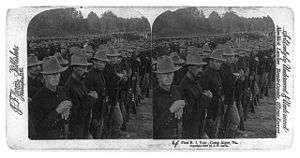1st Rhode Island Infantry
The 1st Rhode Island Infantry were two regiments of the United States Army, the first of which was raised in 1861 at the beginning of the American Civil War on a 90-day enlistment, the second during the Spanish–American War in 1898. There was also the 1st Rhode Island Regiment which served in the Continental Army during the American Revolution. q.v.
1st Rhode Island Volunteer Infantry Regiment
This regiment, originally called the 1st Rhode Island Detached Militia, was organized in Rhode Island in April 1861, the regiment moved to Washington, D. C., on April 20 and 24, 1861. After duty at Camp Sprague in the defences of Washington, on July 16 it was attached to Burnside's Brigade (Ambrose Burnside) of Hunter's Division (David Hunter) in McDowell's Army of Northeastern Virginia (Irvin McDowell). The regiment advanced on Manassas, Virginia, on July 16–21, seeing action at the First Battle of Bull Run on July 21. It left Washington, D. C. for home on July 25, and mustered out on August 2, 1861. During its service, the regiment lost 1 officer and 16 enlisted men killed and mortally wounded, and 8 enlisted men by disease, for a total of 25.
1st Regiment, Rhode Island Volunteers
Under proclamation signed April 23, 1898, President William McKinley ordered the call up of 125,000 troops. Rhode Island was directed by Secretary of War Russell A. Alger to raise a regiment of infantry from existing militia units in lieu of conscripting 720 individuals to augment the Regular Army as U.S. Volunteers by letter dated April 25, 1898. On May 2 the state established a camp site at Quonset Point in Rhode Island, and formally named the site "Camp Dyer" in honor of Governor Elisha Dyer, Jr. on May 7, 1898. The regiment began to muster until fully assembled between May 10 and 17, with Colonel Charles Wheaton Abbot, Jr., commanding. Initially the unit consisted of forty-six officers and 958 enlisted men. This regiment, the only infantry regiment raised on Rhode Island during the war, was constituted of several militia infantry units in Rhode Island as well as individual volunteers.

The unit was assigned to the 3rd Division, Second Army Corps and reported for duty at Camp Alger, Virginia, from late May. However the regiment and the rest of Second Corps left Camp Alger in early August 1898, due to a typhoid fever epidemic. The regiment relocated to another part of Virginia at Thoroughfare Gap in an attempted run from the virus. However, conditions in Thoroughfare Gap resulted in dysentery and malaria, and the unit eventually relocated to Camp Meade, Pennsylvania with the rest of Second Corps in August 1898. The overcrowded conditions forced the relocation of the 3rd Brigade of the 2nd Division of Second Corps to Camp Fornance, South Carolina.
The regiment was mustered out of federal service on March 30, 1899 at Columbia, South Carolina. The unit returned to Providence and handed over colors to Governor Elisha Dyer after a parade past city hall on April 1, 1899. At the time of muster-out, the regiment included forty-five officers and 1,039 enlisted men. During its term of service, the unit lost eleven enlisted men who died from disease and one enlisted man who died as the result of an accident. Thirty-five more enlisted men were discharged for disability. Interestingly the unit also had thirteen enlisted men court-martialed and eighty-nine men deserted the regiment.
The regiment nicknamed itself the "Rough Walkers" which was inspired by Roosevelt's Rough Riders. Veterans of the regiment received an unofficial medal called the Rough Walker Medal.
Unit timeline
- May 20, 1898, fully mustered at Camp Dyer, Quonset Point, Warwick, Rhode Island.
- May 27, departed Camp Dyer for Camp Alger, Dunn Loring, Virginia.
- May 30, arrived in Camp Alger.
- Aug 3, departed Camp Alger for Thoroughfare Gap, Virginia.
- Aug 8, arrived in Thoroughfare Gap.
- Aug 21/22, departed Thoroughfare Gap for Camp George Meade, Harrisburg, Pennsylvania.
- Aug 23/24, arrived at Camp George Meade.
- Nov 13, departed Camp George Meade for Camp Fornance, Columbia, South Carolina.
- Mar 1, 1899, unit disarmed, and muster out date set for March 30.
- Mar 30, mustered out of service at Camp Fornance, departed for Jersey City, New Jersey by rail road.
- May 31, arrived in Jersey City and embarked aboard the steamer Rhode Island for Providence, Rhode Island.
- Apr 1, 1899, arrived at India Point wharf and paraded past city hall, and turned over colors at Dexter parade ground (unit temporarily rearmed at pier and disarmed at parade ground).
Organization
- First Regiment Rhode Island Volunteers
- Field and Staff
- Company A-M
Other units
In addition to the first regiment, the state of Rhode Island raised the following units for the war with Spain:
- Light Battery A, 1st Rhode Island Volunteer Artillery.
- Light Battery B, 1st Rhode Island Volunteer Artillery.
- 1st Provisional Company of Infantry commanded by Lieutenant Theodore Francis Green, a future Governor of Rhode Island and United States Senator.
- Members of the Rhode Island Naval Militia who served under federal orders.[1]
- Members of Rhode Island who were assigned to the USS Vulcan as part of the U.S. Navy.
- Members of the state Rhode Island Militia Hospital Corps who served under federal orders.
See also
- 1st Rhode Island Regiment, American Revolutionary War unit
- Rhode Island in the American Civil War
- List of Rhode Island Civil War units
References
- ↑ "Spanish American War - RI Naval Militia in United States Service". Rhode Island Secretary of State Official Website. Retrieved 9 August 2015.
- Rhode Island in the War with Spain, published by Rhode Island and Providence Plantation, a compilation of records and letters, compiled 1900.
External links
- A narrative of the campaign of the First Rhode Island Regiment, in the spring and summer of 1861: illustrated with a portrait and map (1862) on the Internet Archive